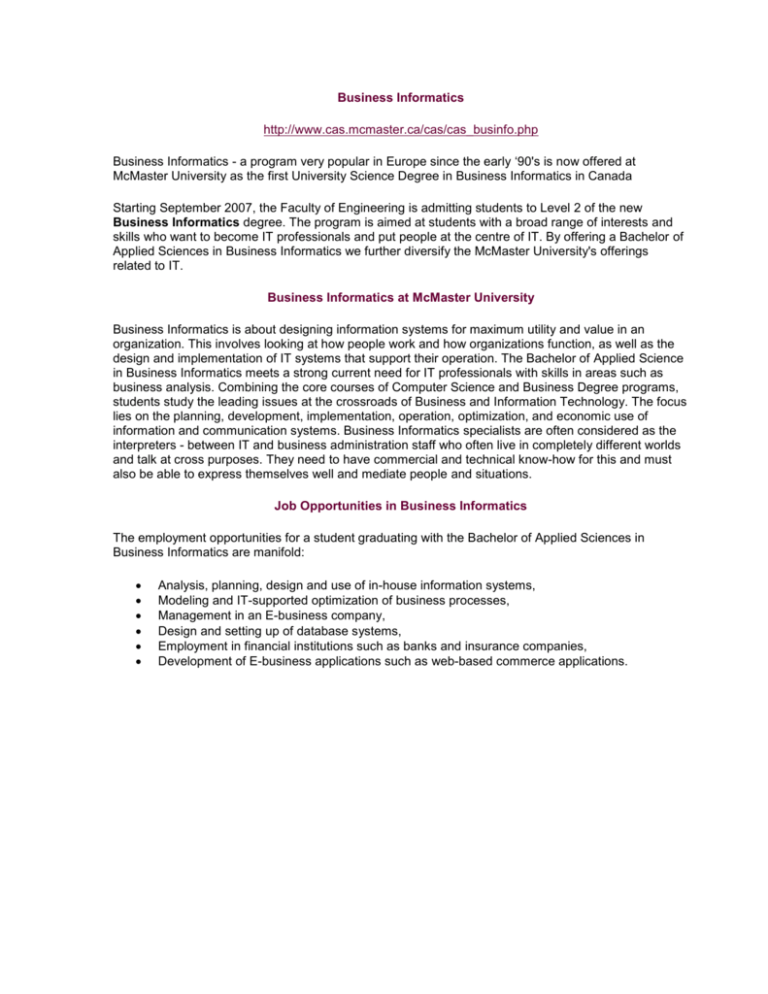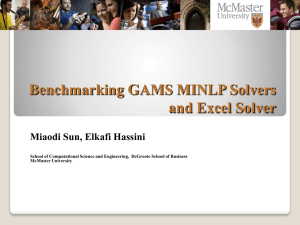Faculty/department profiles: - Faculty of Engineering
advertisement

Business Informatics http://www.cas.mcmaster.ca/cas/cas_businfo.php Business Informatics - a program very popular in Europe since the early ‘90's is now offered at McMaster University as the first University Science Degree in Business Informatics in Canada Starting September 2007, the Faculty of Engineering is admitting students to Level 2 of the new Business Informatics degree. The program is aimed at students with a broad range of interests and skills who want to become IT professionals and put people at the centre of IT. By offering a Bachelor of Applied Sciences in Business Informatics we further diversify the McMaster University's offerings related to IT. Business Informatics at McMaster University Business Informatics is about designing information systems for maximum utility and value in an organization. This involves looking at how people work and how organizations function, as well as the design and implementation of IT systems that support their operation. The Bachelor of Applied Science in Business Informatics meets a strong current need for IT professionals with skills in areas such as business analysis. Combining the core courses of Computer Science and Business Degree programs, students study the leading issues at the crossroads of Business and Information Technology. The focus lies on the planning, development, implementation, operation, optimization, and economic use of information and communication systems. Business Informatics specialists are often considered as the interpreters - between IT and business administration staff who often live in completely different worlds and talk at cross purposes. They need to have commercial and technical know-how for this and must also be able to express themselves well and mediate people and situations. Job Opportunities in Business Informatics The employment opportunities for a student graduating with the Bachelor of Applied Sciences in Business Informatics are manifold: Analysis, planning, design and use of in-house information systems, Modeling and IT-supported optimization of business processes, Management in an E-business company, Design and setting up of database systems, Employment in financial institutions such as banks and insurance companies, Development of E-business applications such as web-based commerce applications. Chemical Engineering http://chemeng.mcmaster.ca/ Chemical Engineering at McMaster is committed to providing our students with a strong foundation in the basic sciences, as well as exposure to modern technologies. Our goal is to prepare our students for their career path in specific industrial sectors by exposing them to current theories and technology. To achieve this goal, the department has identified a number of technical focus areas that link our teaching and research expertise and in which we can provide to the students as a package of courses. Chemical Engineering at McMaster University The departmental focus areas allow students to specialize in one of two possible ‘streams’ which will be denoted on their transcript upon completion of their degree. The streams available are: polymer materials & manufacturing, and automation. The technical courses comprising each stream are taken as electives in the student’s upper years. The technical electives recommended for students interested in a career in the manufacturing industries, involving polymer materials and manufacturing, are selected from Chemical, Mechanical, and Materials Engineering courses appropriate to the area. We have a similar list of recommended electives for process control and automation. The upper year projects for our students have a significant industrial component tailored to each of the three streams mentioned, addressing the concerns of real industrial clients. Job Opportunities in Chemical Engineering Graduates from McMaster Chemical Engineering have gone on to work in a variety of companies including: Nova Chemicals, Elsag Bailey, Zenon Environmental, Dow Chemical, Dofasco, Procter and Gamble, 3M, Uniroyal, Xerox Canada, DuPont, HEMOSOL, Huntsman Corporation, AstraPharma, and Petro Canada. Chemical Engineering graduates can also be found pursuing careers in medicine, dentistry, law, business, and teaching. Other students choose to go on and do advanced degrees including Master of Applied Science (M.A.Sc.), Master of Engineering (M.Eng.), and Doctor of Philosophy (Ph.D.). Chemical Engineering & Bioengineering Chemical Engineering and Bioengineering is an and unique 5-year program offered in the Department of Chemical Engineering at McMaster University, leading to a Bachelor of Engineering and Biosciences degree. It combines the core Chemical Engineering undergraduate curriculum with courses from the Biology Sciences as well as Chemical Engineering specific courses in areas related to Bioengineering. Chemical Engineers use the basic principles of chemistry, mathematics, physics, biology, and economics combined with skills in computers to design, operate, and troubleshoot processes that are used in the manufacture of materials that are the building blocks of almost everything around us. Chemical Engineering & Bioengineering at McMaster University Students in the regular Chemical Engineering program develop a strong foundation in basic Sciences and have the opportunity to participate in courses aimed at developing problem solving, team, selfassessment, and lifelong learning skills. In addition to this, the Chemical Engineering and Bioengineering program includes courses in biology, human anatomy and physiology, biochemistry of macromolecules, cellular and molecular biology, and the application of biological processes to Chemical Engineering through courses in bioseparations and bioreactors. The courses have been integrated to allow the students to make links between their Chemical Engineering knowledge and its application in the biotechnology industries. There is a significant laboratory component related to biology and biochemistry that will give the students the skills to succeed in a biologically oriented environment. Similar to the core Chemical Engineering program, the Chemical Engineering and Bioengineering program allows the students to select from a variety of focused technical electives in their fourth and fifth years of study, based on the research interests of the various faculty members involved in the program, including courses in biomaterials and tissue engineering, biological wastewater treatment, biological membrane separations, biosensors and biological pharmaceutical production. The curriculum has been designed to cover a wide scope, allowing students to graduate with the degree Bachelor of Engineering and Biosciences and giving them maximum flexibility to pursue their interests in their careers. Job Opportunities in Chemical Engineering & Bioengineering The graduates from this new and unique program will be qualified to make significant contributions to Canada’s expanding biotechnology industry. Canada currently has the second highest number of biotechnology companies in the world, following the United States. This industry is mainly concentrated in Ontario, Quebec and British Columbia and is nowadays poised for significant expansion with our aging population, need for better pharmaceutical products, our growing awareness of the importance of the environment and our desire to minimize the impact of current processes on the environment. Graduates from the program will participate in the development of better, more biocompatible biomedical devices, more efficacious pharmaceuticals with fewer side effects, more efficient and improved environmental processes and better methods for the production of food and beverages. Since graduates from the program will also have all of the core courses in Chemical Engineering, they will also be able to do traditional chemical engineering jobs in fields such as petrochemicals, polymers, process control and pulp and paper. Civil Engineering http://www.eng.mcmaster.ca/civil/ The McMaster Civil Engineering Undergraduate programs are designed to permit studies over a broad base of fundamental topics, with the opportunity to specialize in specific disciplines in the upper years of the program. We have two focus areas, or streams, for students to choose: “Water and Environmental Engineering” or “Structural and Geotechnical Engineering” The Civil Engineering program provides the training to make use of modern materials, computational methods, and other scientific developments. That use must be balanced with understanding and concern for the impact of current decisions on the quality of life for future generations. Senior students have the option of either specializing in a particular area or maintaining a wide spectrum of courses. The recognized high level of research activity of the faculty ensures that course work is at the forefront of engineering, while close contact with industry helps introduce students to practical considerations. Structural and Geotechnical Engineering at McMaster University Structural and Geotechnical Engineering uses common materials such as steel, concrete, wood, masonry and soil to design and construct buildings, bridges, tunnels, dams, foundations, tanks, and many other facilities. In the structural/geotechnical stream we integrate basic theory, practical laboratory work, experience in both analysis and design, and real-life examples into a comprehensive program that give the students the skills necessary to enter this exciting and challenging profession. Some examples of what we do in the undergraduate program include: Analysis and design of low and high rise buildings and bridges, Computer analysis of structural and geotechnical systems, Laboratories in geomechanics and structural mechanics, Analysis and design in various materials including steel, concrete, masonry and wood, Foundation design. Job Opportunities in Structural and Geotechnical Engineering McMaster graduates in Structural/Geotechnical Engineering continue to have a significant impact on the practice and development of the profession. Some of our graduates work with consulting companies, for private businesses, with all three levels of government, and in education. Environmental Engineering at McMaster University Environmental Engineering combines scientific principles, computer modeling, and aspects of public policy to create practical solutions for improving the quality of our air, water, and soil. Environmental Engineers work in a multi-disciplinary context to design systems which minimize the use of materials, energy, and water and maximize the protection of our natural ecosystems and built communities. In addition to obtaining the fundamental training to be a Civil Engineer, our environmental students receive specialized training in environmental engineering in the following courses: Ecological and Geological Aspects of Civil Engineering, Introduction to Bioprocess Engineering, Fluid Mechanics, Municipal Engineering and Design of Water Resource Systems, Water Quality Engineering, Water and Wastewater Treatment, Environmental Impact and Sustainability. Electrical & Computer Engineering http://www.ece.mcmaster.ca/ The Department of Electrical and Computer Engineering at McMaster University is a growing and dynamic department offering undergraduate and graduate degrees. McMaster's Electrical and Computer Engineering programs were ranked both nationally and internationally as one of the best departments of their kind. The Department is also proud of the accomplishments of its members and the awards and recognition they have received over the years. These include the prestigious Premier Research Excellence Award (PREA), OCUFA teaching award, McMaster Students Union Teaching Award, Booker Gold Medal, Signal Processing Society Education Award, and many others. The department offers programs leading to the Bachelor of Engineering degree in Computer Engineering, Electrical Engineering, as well as Electrical and Biomedical Engineering. What's special about Electrical Engineering at McMaster University The department offers a personalized environment where students are able to meet one-on-one with their professors, many of whom are world-renowned leaders in their field. McMaster’s special facilities include the Electronics, Control and Computer Laboratory, the Communications Research Laboratory, and the Power Research Laboratory. Members of the Electrical and Computer Engineering department are engaged in leading-edge research in areas such as: Biomedical Engineering, CAD/Optimization/Simulation, Communications, Computer Engineering, Image Processing & Multimedia, Microelectronics, Microwaves, Networks, Photonics / Optoelectronics, Power Engineering, Signal Processing. Job Opportunities in Electrical & Computer Engineering Electrical Engineering provides an extremely broad background which prepares students for a variety of opportunities in the workplace. Potential fields include: Telecommunications design, Power Systems, Electronics, Internet, Satellite Communications, Marketing, Electronic Commerce in the banking industry, Software Systems. Electrical & Biomedical Engineering http://www.ece.mcmaster.ca/academic.htm McMaster’s Electrical and Biomedical Engineering is a unique four-year undergraduate program that combines a full Electrical Engineering degree with key courses in the Biological Sciences. By the end of the third year, students in the program will have completed all of the pre-medicine courses required by the MCAT and for entrance into Medicine at most Canadian and American medical schools. At the end of the fourth year, students may opt to continue for a fifth year and receive a Master’s degree (this option is still in the approval stages). Electrical & Biomedical Engineering at McMaster University The 20th century has witnessed the emergence of biology and medicine as disciplines of technological innovations. Scientific and technological advances in bio-medicine as well as ongoing debates about Canada’s national health care system have generated strong social and economical interests in development and deployment of biomedical technologies. Biomedical Engineering is a fast-growing field that involves the application of engineering science and technology to the solution of problems in medicine and biology. Biomedical Engineering bridges the historical separation between the biological and medical sciences and the engineering and physical sciences, thereby spanning interdisciplinary boundaries. Areas of research within the department include: biomedical imaging and signal processing techniques, analysis of cardio-respiratory control, implantable biological sensors, speech and hearing engineering, computational, theoretical and experimental neuroscience in motor and sensory systems, and computer-based systems and techniques for recording and analyzing physiological signals. Job Opportunities in Electrical & Biomedical Engineering Graduates from the program may choose to pursue careers as Electrical Engineers, or may choose to enter the field of Biomedical Engineering and develop medical technology and systems for applications such as bio-sensors, computer-assisted minimal access surgery, tele-robotic surgery (involving surgeons and patients separated by hundreds of kilometers), as well as sophisticated imaging techniques such as Computer Tomography and Magnetic Resonance Imaging. Some graduates may also choose to apply for entrance to medical schools. Honours Computer Science http://www.cas.mcmaster.ca/cas/0template1.php?907 The Computer Science program offers a unique combination of scientific and interdisciplinary study and reflects the growth prospects of a multi-billion dollar industry and the ability for individuals to make a difference. Most fields and professions rely on computers to assist in problem-solving and the efficient processing of information. While computers themselves are now relatively inexpensive and the hardware is mass-produced, it is the program, the instructions that control the computer that transforms a piece of hardware into an indispensable tool. No other discipline has grown so fast in such a short time, and none has better prospects for its graduates in a world that does not cease to find new uses for information technology. Honours Computer Science at McMaster University In 2006, the Department of Computing and Software implemented the newly designed Computer Science Undergraduate program. To meet the demands of employers, the curriculum has been completely modernized and redesigned. The new program is built on three columns: Programming courses, Software Design courses, Systems oriented courses. The following gives a short list of key topics/courses offered: Imperative Programming and Basic Data Structures, Object Oriented Programming, Digital Systems, Computer Architecture and Organization, Theory of Computation, Communication Skills, Software Design, Software Specification, Software Requirements, Information Security, Data Bases, Human Computer Interaction, Web Systems and Web Computing. Job Opportunities in Honours Computer Science Many of our graduates now work as Systems Analysts, Operations Managers, Database Administrators, Systems Programmers, or Programmers in a wide range of companies and organizations. Furthermore the breadth of the Computer Science programs provides a solid foundation for students wishing to follow other career paths, be they employment or graduate study in other technical or professional fields. The program’s design philosophy ensures that our students understand the fundamentals and gives them the key advantage in today's job market. Engineering Physics http://engphys.mcmaster.ca/ A degree in Engineering Physics will prepare students for entry into some of today’s most exciting technologies - areas such as lasers, fiber optic communications, microelectronics, information technology, nuclear power, and nuclear instrumentation. The program provides a broad background in basic science and engineering that is essential for the rapidly changing high technology environment that Engineers face in the years ahead. An education in Engineering Physics provides the students with a solid an understanding of how to apply basic science to the solution of engineering problems. Engineering Physics at McMaster University Engineering Physics is a link between basic science and the traditional branches of engineering. Engineers often face challenges that require an understanding of many aspects of a technical problem. To meet these challenges, Engineering Physics graduates rely on a solid background in physics, chemistry, and mathematics, as well as experience in other engineering disciplines such as Materials, Mechanical, Chemical, and Electrical Engineering. This integrated union of disciplines is required most urgently in the development and emerging applications of high technology, and graduates of the Engineering Physics program are frequently employed in these areas. Career Opportunities for Engineering Physics Graduates Engineering Physics graduates have many career options due to the flexibility developed through a broad background in mathematics, physics, materials science, electronics, computer systems, and optics. There are many different job titles that describe what graduates of the Engineering Physics program are now doing. Telecommunications, laser applications, and nuclear engineering are just a few of the career paths on which our graduates have followed. Many graduates choose to continue their studies earning Masters or Ph.D. degrees. Some of the companies that have hired Engineering Physics graduates from McMaster in recent years are: Atomic Energy of Canada Ltd. Babcock and Wilcox Canada Bell Canada Bombardier Aerospace Bruce Power Inc. Canadian Nuclear Safety Commission Celestica Chrysler Canada Colt Engineering COM DEV CompuCARE Systems CP Rail Cutler-Hammer De Havilland Inc. DOFASCO EDS ELCAN Optical Technologies Elsag Bailey (Canada) Inc. Falter Engineering Gamma Foundries Ltd. GE Medical Systems Genesis Microchip Inc. Gennum Corp. GSI Lumonics Hamilton Health Sciences Hatch Associates Honeywell Ltd. Hydro One Hydro Quebec IBM Imaging Research Inc. Intel JDS Uniphase L3 Communications -Wescam Luxell Corp. McMaster University MD Robotics MDS Sciex Metrophotonics Inc. Mytec Technologies National Research Council of Canada NB Power Newbridge Networks Corp. Nortel Networks North American Detectors Nuclear Safety Solutions Ontario Power Generation Optikon Corp. Oracle Pembina Exploration Ltd. Perkin Elmer Picarro Procter & Gamble Research in Motion (RIM) Sabeus Photonics Semiconductor Insights SiGe Microsystems Spar Aerospace Starwave Corp. Texas Instruments Thomson Engineering University of Alberta University of Toronto University of Waterloo Visteon Wardrop Westaim Cor Materials Science and Engineering http://mse.mcmaster.ca/ The McMaster Materials Engineering programs are designed to permit studies over a broad base of fundamental topics, with the opportunity to specialize in specific materials systems in the upper years of the program. The materials engineering content of each of the programs is identical - in each case there is a common core which emphasizes basic physical chemistry, thermodynamics and kinetics, materials structure, and materials processing fundamentals. Major emphasis is placed on the relationship of materials properties to processing and to their engineering function for proper materials selection in engineering design. Students specialize by taking appropriate elective courses permitting specialization in one or a combination of: Ceramics and Glasses,* Electronic Materials, Metals and Alloys, Polymers. *Ceramic Engineering was the first such undergraduate program in a Canadian University. This strong tradition may still be pursued by interested students within the Materials Engineering program. Particular elective courses available to all students are also presented on Corrosion, Composite Materials, Materials Processing (Joining and Mechanical Working). In every case such courses are based on some aspect of the broad range of materials research in progress under the direction of the faculty who teaches these courses. Honours Materials Science (Specialist) The Department of Materials Science and Engineering actually pre-dates the establishment of the McMaster Faculty of Engineering. It was, and remains, a department within the Faculty of Science as well as the faculty of Engineering. This permits students to follow a program of study in Materials Science, leading to the Bachelor of Sciences degree. The Materials Science program emphasizes basic chemistry, physics, and mathematics knowledge, and also comprises many courses common to the Materials Engineering programs. However, there are more opportunities for selecting open technical electives in the Materials Science program, thereby permitting in-depth study in sub topics of particular interest. The science program permits a stronger emphasis on electron properties and the study of relevant aspects of quantum mechanics and advanced solid state physics. Materials Science Minors in other Bachelor of Sciences Programs A combination of Materials courses may also be taken to represent a Minor in other science programs, such as Chemistry, Physics, and Geology. Packages of courses are defined in the calendar to provide Minors both in Materials Properties and in Materials Processing. Mechanical Engineering; Manufacturing Engineering http://www.mech.mcmaster.ca/ Mechanical Engineering is one of the major divisions within the Engineering profession and its principles are involved in the design, development, and construction of nearly all of the physical devices and systems which technology has produced. Mechanical Engineers are also concerned with the operations of all kinds of machinery, and the production of power. They must conceive research, design, develop, test, manufacture, and sell equipment for these purposes. Manufacturing Engineering is a complex discipline and requires a great deal of specialized knowledge. Manufacturing Engineers are in demand with different kinds of companies which manufacture a great variety of machines, robotics, and other equipment. The Manufacturing Engineer may be responsible for the design, selection of materials, specifications and the improvement of production processes and equipment. Responsibility for plant layout, production management and control, as well as plant maintenance is also required of Manufacturing Engineers. The Manufacturing Engineering Program at McMaster is unique in Canada. Mechanical Engineering at McMaster University Mechanical Engineers use the principles of physics and mathematics to design and manufacture various types of mechanical systems such as cars, airplanes, automated systems, and power plants. Mechanical Engineering is a very broad discipline, and our graduates perform a range of functions that can be found in almost every industry in Canada. In fact, approximately 4 out of 10 engineers in Canada are Mechanical Engineers. Mechanical Engineering is generally divided into three areas: Manufacturing & Materials: - Designing and developing manufacturing processes, - Studying properties of materials and developing new ones. Mechanics & Design: - Designing mechanical systems including automobile and airplane components, - Working with Manufacturing Engineers to develop robotic and automated manufacturing systems. Thermal Fluid Sciences: - Studying gas flow, heat transfer, thermodynamics and combustion, - Designing for aerodynamics, - Designing, building and maintaining power generation plants, air conditioning systems, and systems to control air pollution. Job Opportunities for Mechanical Engineers Mechanical Engineering graduates can look for employment in almost every type of industry. Traditional mechanical industries involve the design, development, and construction of transportation, power plants, automotive, steel and metal production, farm implements, heavy equipment, machine tools, turbines, robotics, etc... Mechanical Engineers also work in many emerging areas, such as bio-mechanical engineering, nanotechnology, and mechatronics systems and play an important role in developing renewable energy sources, developing “green” technologies, and more energy efficient cars that will reduce society’s impact on the environment. Mechatronics http://www.cas.mcmaster.ca/cas/0template1.php?902 Mechatronics Engineering is a modern discipline that transcends the boundaries between Embedded Systems, Mechanical, Electrical, and Computer Engineering. Mechatronics Engineering is commonly defined as "The discipline that focuses on the design and control of electromechanical devices" or "the integration of electronics, control engineering, and mechanical engineering." The Mechatronics Engineering Program is built on a collaboration of the Department of Computing and Software, Mechanical Engineering and Engineering Physics. This collaboration allowed us to expose the students to a balance of all topics related to Mechatronics. The Mechatronics Program at McMaster At different Universities Mechatronics Engineering is offered with different flavours - Mechanical, Electrical, or Embedded Systems. We, at McMaster University, have designed an innovative world class Mechatronics program that offers a balance of Mechanical, Electrical and Software content with a focus on Embedded Systems Design. Our Mechatronics program gives students a solid foundation in Mechanical, Software and Electrical Engineering and then exposes students to a suite of innovative Mechatronics specific lab-based courses for a hands-on experience that provides significant advantages in today’s job market. Job Opportunities for Mechatronics Engineers Today's designers are faced with the task of combining elements of mechanics, electronics, embedded systems, and digital signal processing, while coping with the miniaturization of components and use of prefabricated parts. The synthesis of different technologies is already included in modern precision engineering. Continuing developments in miniaturization and fabrication will provide further challenges for Mechatronics Engineers. The demands of current and future technologies require Engineers that have interdisciplinary skills. The breadth of education required by Mechatronics Engineers will not only provide such skills in the short term, but will enable them in the long term to effectively adapt to rapidly shifting technologies. Mechatronics Engineers are employed in a large variety of industrial sectors: Manufacturing, Automotive, Aeronautics, Power Generation and Distribution, Chemical, Telecommunications, and Medical Industry. Software Engineering http://www.cas.mcmaster.ca/cas/0template1.php?903 Software Engineering is much more than programming. Software Engineers have mastered the fundamentals of the profession but specialize in the design and development of computer systems and software. The digital computer has changed the nature of our world, making software a key technology, with most organizations, and an increasing number of people, no longer able to operate effectively without a computer. While computers are now relatively inexpensive because the hardware is mass produced, it is the program, the instructions that control the computer that turns a general purpose piece of hardware into something that performs specific tasks. Today, a relatively small number of people design computer hardware, but the demand for good software designers is strong and growing rapidly. Since it is the software that turns the general purpose hardware into a specific product, it is Software Engineers who bear the ultimate responsibility for the usability, safety, and reliability of the final product. Because Software Engineers must understand what is going on outside of the computer, not just the software, the McMaster program includes much more than software design. Software Engineering at McMaster University At McMaster we have taken the position that Software Engineering is a branch of engineering and have applied well-established principles of engineering education in this new specialty. In addition to teaching software design, SE students learn a lot about other areas of engineering and are prepared to work in many application areas. The program is accredited by the Canadian Engineering Accreditation Board. The McMaster Software Engineering program stresses fundamental concepts and principles of software design, principles that do not change, because only those who learn the fundamentals will be prepared for a career that will last many decades. A guiding principle of McMaster’s Software Engineering program is the integration of theory and practice. Rather than have some courses identified as theoretical and others identified as practical, our approach is to integrate theory and practice in every course. No theory should be taught without showing the student how to use it. No practical problem solving technique should be taught unless theory shows that it is sound. Students are given practical (computer) assignments that teach them how theoretical concepts can be applied. McMaster’s research group in Software Engineering is known throughout the world and has received a great deal of support from both government and industry. Bell Canada and NSERC established an Industrial Research Chair in Software Engineering at McMaster and Bell Canada subsequently provided support for McMaster's Software Quality Research Laboratory (SQRL). Because of this strength, the McMaster Faculty of Engineering was the first in Canada to develop a Software Engineering program that could be accredited by the Canadian Engineering Accreditation Board. Unique at McMaster: SOFTWARE ENGINEERING AND GAME DESIGN (B.Eng): http://www.cas.mcmaster.ca/cas/0template1.php?905 This four-year program involves animation, real-time simulation, multimedia, and everything to do with designing and implementing interactive games and data visualization. NEW at McMaster: SOFTWARE ENGINEERING AND EMBEDDED SYSTEMS (B.Eng): http://www.cas.mcmaster.ca/cas/0template1.php?904 This four-year program combines the core of Software Engineering with a sequence of courses that focus on the development of Embedded Systems. Job Opportunities in Software Engineering With a B. Eng. in Software Engineering the students can choose careers in the computer industry, communications, biomedical field, banking, power industry, chemical industry, automotive industry and many more. Bachelor of Technology Program http://btech.mcmastermohawk.ca/ The McMaster University Faculty of Engineering and the Mohawk College School of Engineering Technology are collaborating in the development of a unique concept for the shared delivery of technological education in Ontario. The primary purpose of this endeavour is to offer a Bachelor of Technology degree program with a variety of technical specializations. It builds on the very successful Bachelor of Technology program which has been offered jointly by both institutions since 1997. This type of program is targeted to individuals whose technological interests are applicationsoriented. The programs offered are: A four-year university degree with entry directly from high school leading to both a Diploma in Technology from Mohawk College and a Bachelor of Technology degree from McMaster University, A two-year university degree completion program for graduates of the Mohawk College three-year Diploma in Technology or graduates of similar programs at other Colleges, A Technology Leadership Certificate/Diploma for technologists and internationally credentialed professionals leading to either a certificate or diploma. A major thrust of all of these programs is the inclusion of a significant component (7 one-term courses) of management education in order to ensure that graduates are able to take on supervisory and management responsibilities as they advance in their technical careers. At the same time, these programs close the gap between management and technology to address supervisory shortages in technology-intensive enterprises. The management component is designed to form a cohesive segment which complements the technical program content. Instruction in both the degree completion and four-year program is provided by McMaster and Mohawk faculty members as well as by expert guest lecturers from industry. Information and communications technology - e-learning - is used to supplement classroom learning (e.g. course outline and lecture notes online, testing with results and feedback online, use of email, links to external online resources). The program incorporates flexible delivery modes, e.g. e-learning and evening and weekend classes in order to facilitate the participation of those who wish to pursue the program while continuing to work in industry. Project work in a Co-op context provides graduates with valuable applied work and research experience which will be beneficial in providing additional employment opportunities. A major goal of the Bachelor of Technology concept is to expand the opportunities for people to obtain technological education leading to a degree. The learning, skills, and experiences gained by the graduates of this program will be of significant benefit to employers in industry, business, and government as well as to the personal and professional development of the individuals. Engineering & Management http://www.eng.mcmaster.ca/engandmgt/ The Engineering and Management program combines a regular four-year program in a specific Engineering discipline with the core Business courses of a four-year business program to make a five-year combined degree program. First accredited in 1975, this program is the only disciplinespecific, accredited, Undergraduate Engineering and Management program in Canada. At this time there are over 1,300 Engineering and Management graduates. Elements of the program include: Courses required by the Engineering Faculty: basic sciences, mathematics, engineering sciences, engineering design, complementary studies Courses required by the Business Faculty: accounting, finance, human resources management, labour relations, marketing, managerial decision theory, economics Courses required by the Engineering & Management Department: interpersonal skills, engineering writing, presentation skills, report writing, project management, team building. In the Engineering and Management degree, the management aspect is always combined with a discipline-specific Engineering program, so the offerings are as follows: Chemical Engineering and Management, Civil Engineering and Management, Computer Engineering and Management, Electrical Engineering and Management, Engineering Physics and Management, Materials Engineering and Management, Mechanical Engineering and Management, Mechatronics Engineering and Management, Software Engineering and Management. Students must take Economics in their first year. Students apply to enter the Management program at the end of their first year when they make their discipline choices. A maximum of 136 students are allowed to enter the Management program in Level 2. Job Opportunities for Engineering & Management Graduates In addition to a career as a Professional Engineer, a graduate of Engineering & Management can become a(n): Engineering Project Manager, Engineering Financial Analyst, Accountant, Engineering Marketing Specialist, Production Manager, Industrial Relations Specialist. A major advantage of the program is that it provides skills not available to graduates in any other program in Canada. It not only gives graduates an extra competitive edge in getting a job, but also a competitive edge in management as well, enabling them to fast-track their careers. Engineering & Society http://www.eng.mcmaster.ca/engandsoc/ The Engineering and Society program was created to provide students with a broader university education and to give them greater insight into the way engineering works in society. Graduates of this program learn about the complex issues of socially responsible engineering and can be expected to make this a life-long commitment. The program is fashioned after the Engineering and Management program in that it spreads out the Engineering curriculum over five years, allowing room for another set of subjects. In the Engineering and Society program a set of focused electives and a series of required core courses are taken in addition to the basic Engineering curriculum. This allows Engineering students who have a strong interest in another subject (such as Music, French, or History) to take classes in that subject as well. Since students in the program come from every Engineering discipline and take many courses from other faculties, they acquire an ability to interact effectively with others and to take a multidimensional approach to problem solving. Students develop their oral communication skills through the many group discussions and presentations (both individual and group) required in the core courses. Due to the nature of the material studied, written papers and assignments are common. Students develop a significant proficiency in written communication. The inquiry courses and inquiry approach in other core courses enable students to develop their research skills. This includes an ability to formulate relevant questions and to critically define and assess problems. By the time students are in their final year, they have learned what it takes to be a responsible engineer and to appreciate the broad base of knowledge the core courses offer. The small size of the program results in a sense of community and trust among colleagues. Job Opportunities for Engineering & Society Graduates Typical Industries: Environmental Consulting Public Industry Research Conservation Authorities Federal, Provincial & Municipal Government Resource Industries Industrial Relations Schools & Universities Communications Any industry related to their departmental specialization Career Fields Civil Service Consulting Environmental Assessment Social-Technical Policy City Planning Systems Engineering Education & Teaching Research International Development Safety Engineering Any career related to their departmental specialization New Challenges Designing for Recycling and Reuse Educating for Sustainability Developing Environmental Policy Renewable Energy Appropriate Technology Third World Development Professional & Community Relations Environmental Assessment Preventive Engineering Conservation Engineering and International Studies http://www.eng.mcmaster.ca/engandsoc/international.htm No one can deny that the effects of globalization have been profound. This is particularly true in the engineering profession, where both large and small companies routinely draw talent and resources from the entire World, with little regard for national boundaries. It is not unusual to find, for example, complex systems designed by dispersed North American or European teams, manufactured in China, programmed using software developed in Russia, sold in South America, with technical support from India. In such an environment, an engineer must be able to function in a multitude of cultural settings and be able to coordinate widely dispersed and heterogeneous teams. In an age of just-in-time manufacturing, the engineers must also be able to schedule manufacturing processes in a manner that accounts for costs and delays in the delivery of components. The World is also facing environmental challenges that are intrinsically global. The control of greenhouse gases and air pollution, the treatment of contaminated groundwater, the scarcity of potable water, the infrastructure needed to withstand extreme weather due to climate change, the development and containment of genetically modified foods, etc., are all engineering problems that require international teamwork. The purpose of the Engineering and International Studies programs is therefore to train future engineers who are better able to understand the complexities associated with global project management. Since the development of basic engineering skills is already present in our regular four-year programs, the content of which must be retained, the new programs will only require additional studies that focus on skills and knowledge that are not part of the regular curriculum. These include both an understanding of, and a sensitivity to, the different cultural, political, religious, and historical backgrounds of potential collaborators, as well as additional technical training in areas that are particularly important in international settings, such as international project management and supply chain management Key features: 5-year programs leading to a Bachelor of Engineering & Society degree The only program of its kind in North America Inquiry courses integrated into programs at all levels Designed to meet all requirements of the Canadian Engineering Accreditation Board (CEAB) Administered as a “stream” within Engineering & Society Opportunities for study abroad and/or international Co-op placements






